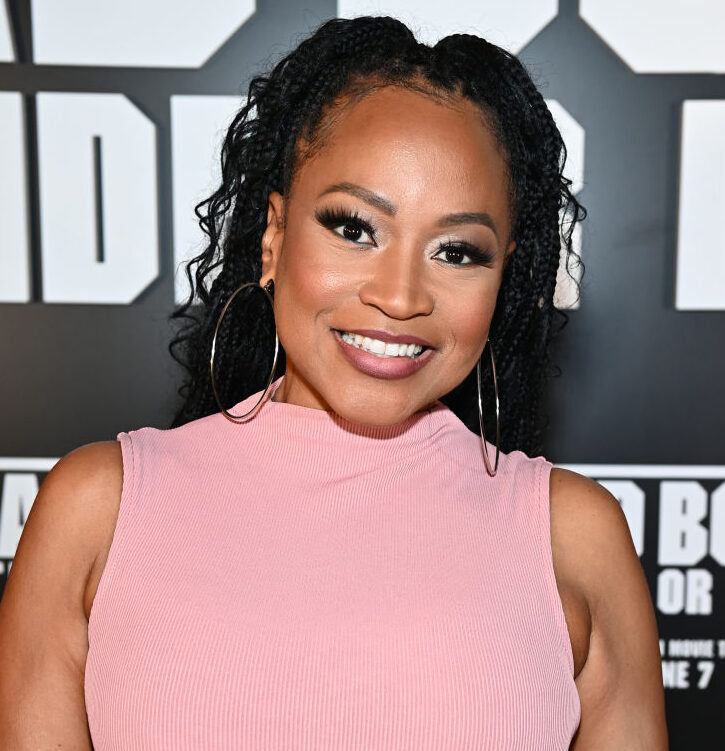Monyetta Shaw-Carter revealed she battled breast cancer in the May 31st issue of People magazine. Shaw is an actress, mother, former radio personality, and reality television star. We may know you as one of the cast of Atlanta Exes, a spinoff of the Hollywood show with the same premise. Or more recently, as a “friend of” the cast on The Real Housewives of Atlanta as well.
Shaw-Carter shared her experience candidly. After taking a private approach to seeking treatment for her breast cancer, the mom and entrepreneur wants to raise awareness by sharing what she went through. She rang the bell on May 2, 2025, after 16 rounds of radiation.
Her First Breast Cancer Scare
“I had a biopsy about 10 years ago and it came back benign,” said Shaw-Carter. Her eventual 2024 diagnosis came after the result of a self-examination.
“Then last year in September I was doing a self-check because I felt this random sensation that I can’t really describe in my left boob. It was like nothing I’ve ever felt before. It was literally like my body was alerting me that something was wrong,” she continued.
There are conflicting medical opinions about the merits of self-breast exams. According to the Centers for Disease Control, “Being familiar with how your breasts look and feel can help you notice symptoms such as lumps, pain, or changes in size that may be of concern.”
In Shaw-Carter’s case, conducting a self-examination was helpful. The exam revealed to her that something had changed in her body prior to her meeting with a doctor. She prioritized getting further testing.
Necessary Screenings Were Done Quickly
The following month, she got a mammogram that revealed she was dealing with stage 1 invasive ductal carcinoma. This kind of breast cancer is extremely common. Patients diagnosed with this kind of cancer have many treatment options available.
Shaw-Carter opted for a lumpectomy and radiation after reviewing the methods that could work for her specific situation. Unlike a full mastectomy, a lumpectomy involves removing the cancerous tissue inside the breasts as opposed to removing the entire breast from the body.
She Considered Her Options and Did Genetic Testing Before Making a Treatment Decision
While doing all of the biopsies and MRIs, I was first considering having a double mastectomy. But after my genetic testing came back favorable, and after sitting in my reality for some time, I decided on the lumpectomy,” said Shaw-Carter.
Those who do not routinely receive mammograms are more likely to be diagnosed in stage 3 or 4. Shaw-Carter advocated for taking a proactive approach to getting regular screenings.
“Because I caught the cancer early, I will be here for my kids,” she said. “There’s nothing more important than getting checked often and early to protect your future. Our health is irreplaceable.”
Early detection is important in all breast cancer cases, but studies indicate that it is even more crucial for Black women, who are significantly more likely to lose their lives from it. The Journal of Breast Cancer Research reports that “Breast cancer mortality rates are 40% higher in Black women compared to White women.” For Black women over the age of 50, the disparity in survival rates is even higher.
Having breast cancer can be mentally and emotionally taxing.
Breast cancer impacts more than the body. It can have a severe mental and emotional toll. “It is a challenging disease that induces a crisis in the patient’s psychological balance and is perceived as a disaster in the eyes of the patient,” according to The Journal of Breast Health. Breast cancer, because of its association with traditional expectations of femininity, can compound these non-physical side effects even further.
Shaw-Carter described how she initially felt about her diagnosis. “It was obviously one of the hardest and scariest moments of my life,” she said. “Everything around me stopped. My heart dropped. I was afraid. I was angry. I was just numb,” she added.
She posted about her current state of mind in a recent Instagram post celebrating her 45th birthday, in which she wore a pink column gown adorned with rectangle-shaped crystals. It was a carousel post. She wore pink boxing gloves, pink boxing trunks, and a pink satin robe in another picture, symbolizing her fight against breast cancer during the previous year of her life.
As a Survivor, Shaw-Carter is Grateful to Be Here.
Shaw-Carter described herself as “stronger than ever” and expressed gratitude for those who supported her throughout the journey, including her family, friends, and the healthcare workers who cared for her.
“This birthday is more than candles and cake…it’s a celebration of life, a reflection of pain & purpose, of healing, and God’s grace. I’ve faced one of the biggest battles of my life… and I WON!!!”
Resources:
University of Rochester: Breast Self-Exams Are No Longer Recommended- Here’s What to Do Instead.
Centers for Disease Control: Screening for Breast Cancer
National Cancer Foundation/Invasive Ductal Carcinoma
Breast Cancer Research Foundation: Black Women and Cancer Disparities: Why They Exist and How to End Them.
The Journal of Breast Cancer Research (Addition of polygenic risk score to a risk calculator for prediction of breast cancer in US Black women)
The Journal for Breast Health (Psychiatric Symptoms and Psychosocial Problems in Patients with Breast Cancer)


